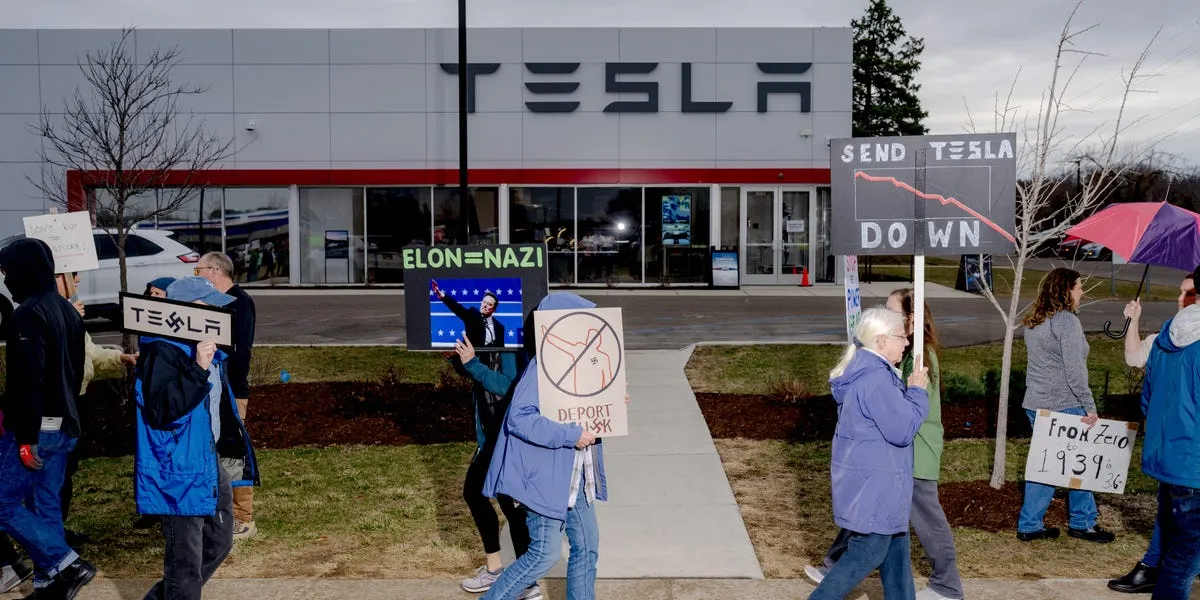
On Saturday, a wave of protests swept through Tesla dealerships and showrooms around the globe, marking a significant surge in resistance against the company's CEO, Elon Musk. This grassroots movement, organized by a group known as Tesla Takedown, aimed to target over 500 Tesla locations worldwide, with approximately half of the demonstrations occurring in the United States.
In a display of unity, protesters gathered in various states, from the traditionally liberal California to the more conservative Florida. Demonstrators wielded signs advocating for a boycott of Tesla and denouncing Musk as a fascist. Many of the frustrations stem from Musk's close ties with the Trump administration, which has aggressively pursued policies aimed at downsizing the federal government by cutting jobs and eliminating entire agencies.
Patty Hoyt, a Marin County resident participating in the protests, expressed her concerns regarding the administration's plan to reduce staffing at the Department of Veterans Affairs. "These are people we made promises to," she asserted, referring to the veterans who depend on the resources provided by the VA.
The discontent with Musk’s political involvement was not limited to the U.S.; protests also erupted across Europe in countries such as France, Scotland, Germany, and the United Kingdom. During Trump's inauguration, Musk's gesture, which some interpreted as a Nazi salute, has left a lasting negative impression in Europe, a continent with a painful history of Nazi occupation during World War II. In response, a protester in France held a sign reading "No Nazi Cars," while demonstrators in London showcased an inflatable figure resembling Musk making the controversial gesture.
Elon Musk's political interests extend beyond the U.S. Last year, he publicly supported the Alternative for Germany (AfD), a far-right political party, prompting concerns about his influence on global politics. Following this endorsement, the AfD achieved its best electoral performance in German history, coming in second place during the national elections in February.
The implications of Musk's political engagements may also be affecting Tesla’s business performance. After reaching a peak valuation of $1.54 trillion in December, Tesla's stock has seen a significant decline, attributed to underwhelming global sales and investor worries regarding Musk’s distractions. According to the European Automobile Manufacturers Association, Tesla's vehicle sales in Europe plummeted by 42.6% in January and February compared to the previous year.
Beyond organized protests, incidents of vandalism and violence have increasingly targeted Tesla dealerships and vehicles. In Austin, the police discovered incendiary devices at a local Tesla showroom, while in Oregon, officers investigated gunfire aimed at another Tesla property. Owners of the much-discussed Tesla Cybertruck have reported facing ridicule and harassment, with one owner stating, "The Cybertruck just seems to send people over the edge a bit. It makes no sense, I'm not Elon!"
In light of the rising tensions, the Trump administration, along with the Department of Justice, has pledged to address the increasing violence against Tesla, labeling these incidents as acts of domestic terrorism. Attorney General Pamela Bondi issued a stern warning, stating, "The days of committing crimes without consequence have ended." She emphasized that anyone participating in such acts would face significant legal repercussions.
As the protests continue, the future of Elon Musk and Tesla is sure to remain a focal point of discussion, sparking debates on the intersection of politics and business in today's climate.